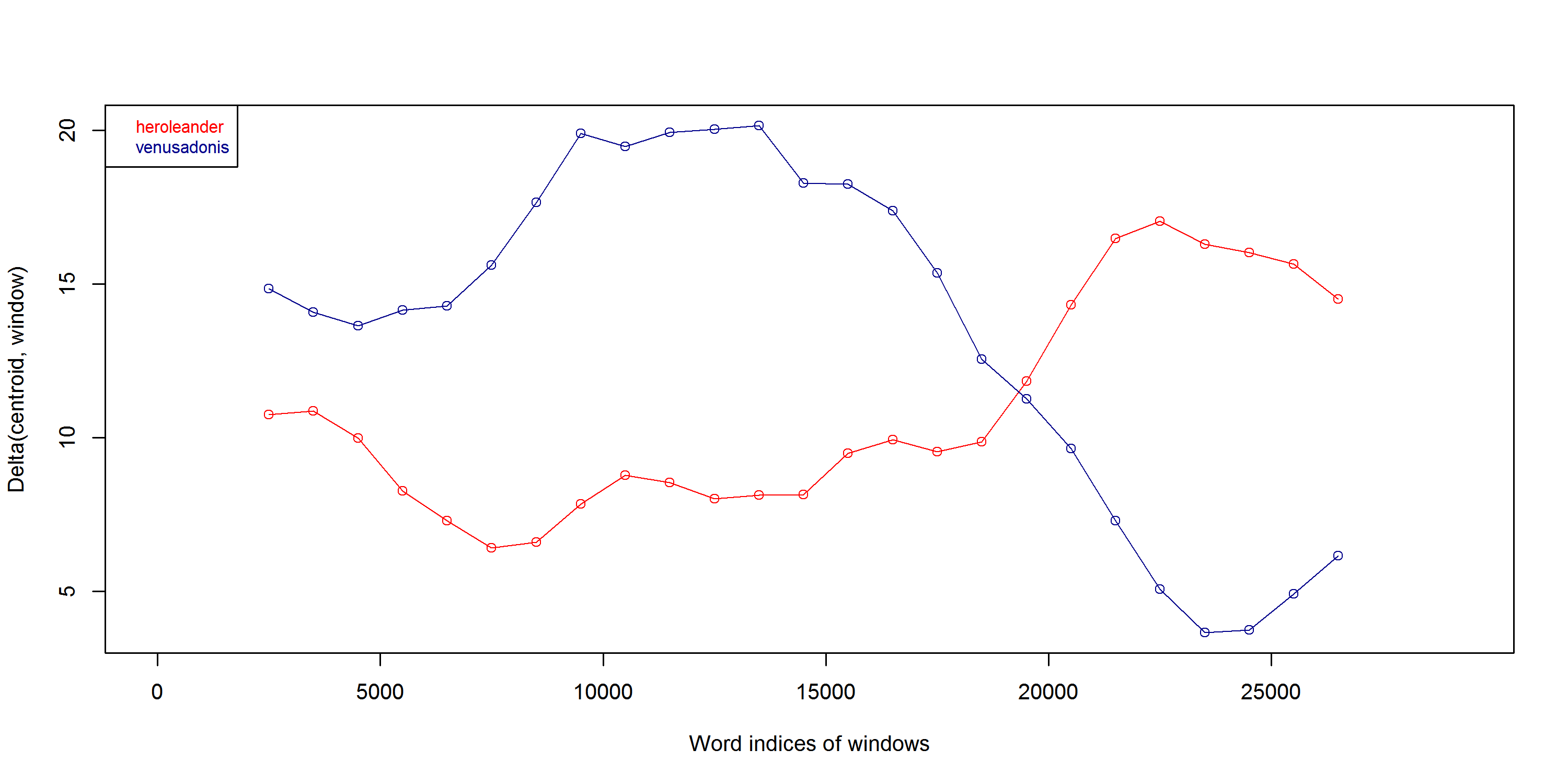Shakespeare Statistics
Marlowe's Hero and Leander and Shakespeare's Venus and Adonis
The following quote comes from The Marlowe Studies Homesite THE CRISTOPHER MARLOWE LIBRARY
and is representative of a large number of conspiracy theories concerning the obscured identity of William Shakespeare.
Venus and Adonis: Shakespeare’s first published work, Venus and Adonis, a long narrative poem, appeared in early June 1593, just two weeks after Marlowe’s reputed death. It is so similar in style, imagery, and tone to Marlowe’s Hero and Leander that critics have concluded that Shakespeare must have had access to the original manuscript since Hero and Leander was not published until 1600. In both poems, for example, the beautiful youth is referred to as “rose-cheeked,” an epithet not found in the classical myths. Both youths are compared to Narcissus who drowned seeking a kiss, another detail unique to both poems and not found in the Greek originals. As A. L. Rowse states, “The poems are full of echoes of each other, theme, arguments, phrases, whole passages” (Christopher Marlowe: His Life and Works, Harper & Row, 1964). Such examples run throughout the canons. Both Dido and Hamlet, for example, describe the slaying of Priam by Pyhrrus with similar details not found in Virgil’s Aeneid or other source. As John Baker has observed, Venus and Adonis is a thoroughly Kentish poem, set on the coast among the downs and brakes where Marlowe grew up (compared to Shakespeare who came from inland Warwickshire). Printer Richard Field: Richard Field, the printer of Venus and Adonis, originally came from Stratford and is assumed by critics to have arranged for Shakespeare to move to London, find employment in the theater, and publish his first work. As publisher of Ovid’s Metamorphoses and other major sources of Marlowe’s early works, Field probably knew Marlowe and could just as easily have been asked to publish the poem under Shakespeare’s name. Lord Burghley, Queen Elizabeth’s principal advisor and Marlowe’s superior in the secret service, is believed by some critics to have commissioned Venus and Adonis and more likely would have selected Marlowe, the darling of the London stage and one of his own agents, than the unknown actor from Stratford. Burghley was also the guardian of Southampton, the young noble to whom Venus and Adonis was dedicated. Field took over the publishing company that had published King James VI’s works in Scotland, further tying him into courtly intrigue and intelligence between the two countries.
Stilometric investigations carried out with R Stylo provide clear evidence that the authors of the two poems in question are not identical.
Craig's zeta gives a list of 26 words preferred by Marlowe (avoided by Shakespeare) and 325 words preferred by Shakespeare (avoided by Marlowe).
preferred Marlowe words: nothing; we; into; might; before; both; most; left; god; thoughts; made; loves; after; man; stood; gold; some; could; men; thought; first; many; your; right; straight; water.
preferred Shakespeare words: fair; beauty; quoth; again; tears; poor; foul; ear; seen; smell; kiss; boar; cheek; arms; dost; lo; rain; disdain; himself; bid; hear; lend; lived; mortal; pity; pluck; sky; slain; voice; air; borrow; chase; fed; green; thousand; hot; over; fear; sun; down; shalt; short; young; begins; comes; mine; tis; pale; breath; tender; am; cold; cheeks; dark; ears; woe; dry; er; flower; grief; twenty; fie; hears; heavy; queen; sees; thyself; breaks; morn; old; says; angry; anon; bosom; canst; courage; danger; dare; grass; hour; jeal-ousy; master; myself; prey; strive; taste; advantage; deer; desperate; faced; forlorn; frown; glutton; hadst; honey; hurt; lily; lion; locks; nurse; pleading; prime; replies; scorn; shows; tells; think; war; warm; wear; thine; look; wind; boy; breast; shadow; lie; tongue; words; eye; unto; set; adonis; horse; lust; whereat; cry; weary; faint; bids; birds; sick; worse; cries; died; doves; field; haste; mouth; sharp; son; backward; beau-teous; better; clouds; destroy; drink; fault; kissing; needs; shakes; ten; thick; wonder; do; art; gone; best; cannot; lies; neck; seem; turn; my; shall; things; looks; ll; some-time; hounds; pay; saith; sport; burn; crest; herself; making; morrow; rein; seems; silly; speak; steed; steel; alive; bear; between; blown; bonnet; breaketh; bred; coal; cool; courser; coward; crystal; despair; embrace; fearful; fee; fly; fool; grim; groan; hairs; help; hue; knows; lean; leaps; learn; legs; mark; obey; rider; seeks; soon; sour; steal; tempest; thieves; troubled; twain; vain; wasted; kill; sorrow; own; bow; flowers; sighs; strong; whereon; been; brow; go; heavenly; open; told; wrong; body; just; teach; why; head; soft; done; fresh; having; true; late; under; hast; take; i; thee; will; hath; death; earth; may; desire; hard; delight; deep; feed; keep; shouldst; amazed; brain; cause; churlish; dumb; fled; increase; remove; signs; sometimes; stealing; summer; unkind; wet; woman; wood; proud; mad; mind; passion; quickly; spring; takes; there-fore; call; lives; tale; together; treasure; far; name; play; prove; lips; can; good; shame; world; high; once; die; thou; thy; doth; me; eyes; heart; never; make; red; each; day; know; long; gentle; leave; must.
The rolling delta function is even more convincing. The two poems were collated and checked against the individual reference texts. The window size was set to 5000 words and the step size to 1000 words. The procedure then uses the relative frequencies of a set of words which were most frequent in the entire collection of reference texts. The representative centroid for each reference text is then compared to the delta values of the text in question. The relatively lower the deltas for a given reference text, the relatively more similar the style in the test window. The collated test text in the chart below was written by two distinct authors, namely Shakespeare and Marlowe.

checked by Hartmut Ilsemann, 13.02.2014
The "best" programme for text analyses can be obtained from the Computational Stylistics Group: Stylo R package